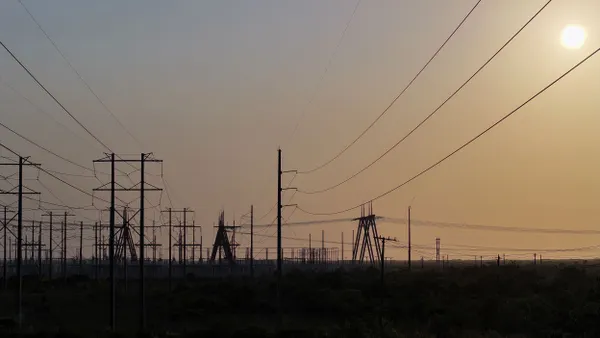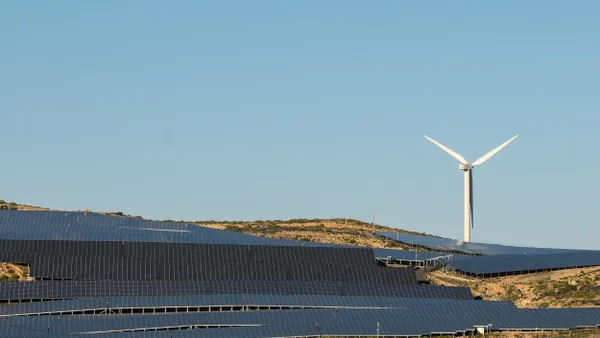Dive Brief:
- Staff at the Washington Utilities and Transportation Commission on Monday filed a complaint against PacifiCorp, doing business as Pacific Power & Light, for failing to incorporate the social cost of greenhouse gases into the resource planning in its clean energy implementation plan, and asked regulators to fine the utility around $730,000.
- A Washington law passed in 2019 requires regulated electric utilities to consider the social cost of greenhouse gases — essentially, the cost of the damages from one extra ton of carbon dioxide emissions — when planning how to invest in their energy supply. Leaving out this consideration could have “meaningful impact” on PacifiCorp’s investment decisions for its subsidiary Pacific Power & Light, according to commission staff.
- State regulatory commissioners will now consider the staff’s recommendation, and have scheduled a virtual pre-hearing conference on June 30.
Dive Insight:
Washington lawmakers passed the Clean Energy Transformation Act, or CETA, in 2019, putting the state’s electric utilities on the path to eliminating coal-fired generation by 2025, achieving a carbon-neutral electricity supply by 2030, and sourcing all electricity from clean resources by 2045. The law also required investor-owned utilities to submit clean energy implementation plans to the regulatory commission for approval, as well as incorporating the social cost of greenhouse gas emissions — currently set by state regulators at $62 per metric ton and set to increase to $95 by 2050 — into their plans.
The social cost of carbon is a well-vetted, widely-used metric used for many purposes including utility resource planning in several states, said Lauren McCloy, policy director of the NW Energy Coalition.
“The purpose of it was to essentially make sure that we’re building the system that we’re going to need for the future, that is going to be increasingly carbon-constrained. And it was really to get beyond this framing of just ‘least cost’ from an economic standpoint, because I think what we’ve seen over time is that ‘least cost’ does not necessarily lead to optimal outcomes in a more holistic way,” she explained.
By incorporating the social cost of carbon into PacifiCorp’s system — which has a large amount of coal and natural gas — “we would expect to see an impact on the dispatch of those thermal resources [in the preferred portfolio], which translates over time into a higher levelized cost of energy compared to cleaner resources,” she said.
PacifiCorp filed its draft clean energy implementation plan last November and according to commission staff, requested an exemption that would essentially allow it to use a portfolio that did not include the social cost of greenhouse gas. The commission denied the exemption request in December, and ordered the utility to include those costs in all of its energy portfolio planning. However, agency staff contended, PacifiCorp filed its final plan on December 30 without the requested change.
In its complaint, commission staff contended that the utility violated state law as well as the commission’s order by not including the cost in its preferred investment portfolio, and recommended that the commission fine it the maximum possible penalty, which is up to $1,000 per day. This would lead to a total fine of up to $730,000 at the time the complaint was filed.
Pacific Power spokesperson Tom Gauntt said in an emailed statement that the utility is "disappointed by this development after holding discussions and working in good faith with [state regulatory] staff regularly over the last several months."
The utility "has had a long, productive working relationship with the staff and commission and we want to continue to build on that relationship in an atmosphere of mutual trust," Gauntt added.
Gauntt said that the utility has worked to make sure its long-term energy roadmap, known as the integrated resource plan, meshes with the 2019 legislation, pointing to its request for proposals for bids to build several thousand megawatts of solar, wind and storage resources over the next decade.
"We look forward to discussions with staff and the commission as well as other interested parties as the process outlined in the filing continues. We hope to resolve this issue in a timely fashion that ultimately benefits our Washington customers," he said.
If the commission opts to impose the fine, it would be the first enforcement action taken by it related to CETA requirements, McCloy noted.
“This shows that commission staff is taking utility implementation of this policy seriously, and is really going to be looking for consistent implementation across the utilities in Washington state on this point,” she said, adding that the optimal outcome, however, would be for PacifiCorp to rectify their plan and rerun their model to incorporate the social cost of carbon into their preferred portfolio.















